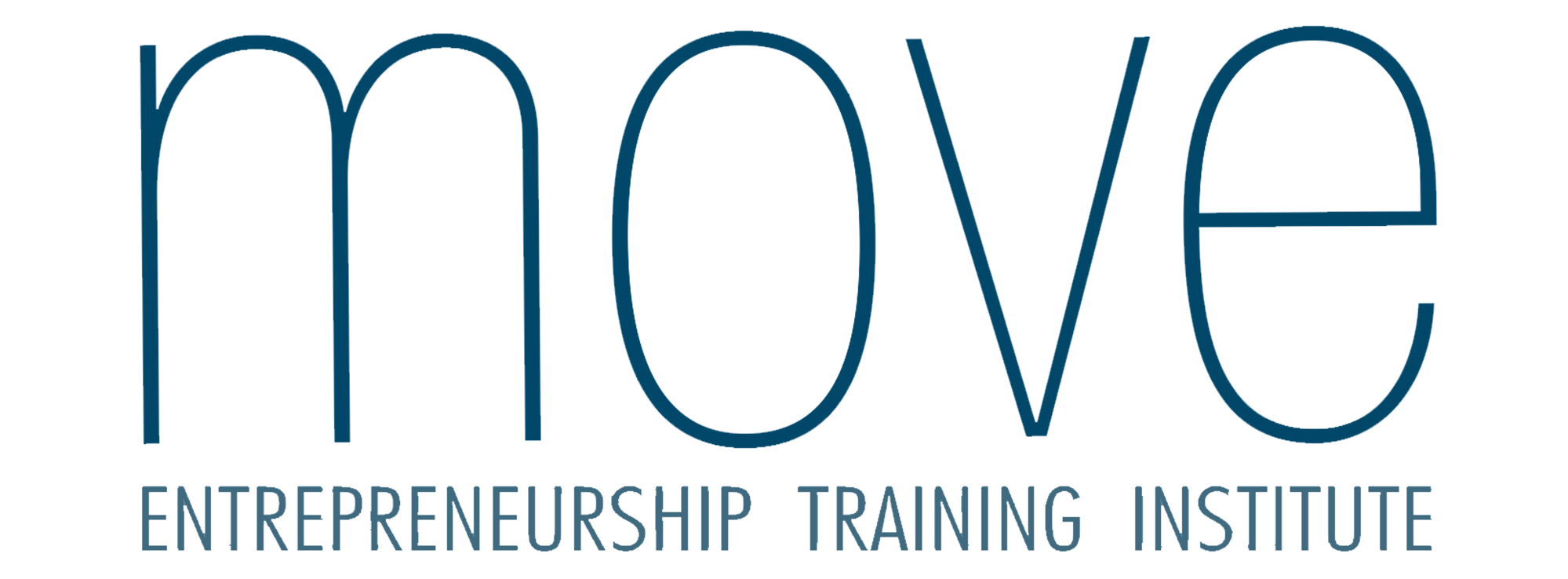projects
Since Prof. Dr. Kim Marie Bischoff, co-developer of STEP and former PhD student of Prof. Dr. Michael Frese, founded the non-profit organisation move-eti in 2015 with the ambition to make STEP and PI training available to as many people around the world as possible, independent of extensive scientific studies and university funding, move-eti has implemented several projects around the world and delivered STEP and PI to different target groups. In this section you can learn more about the projects that move-eti has implemented.
projects implemented by move-eti
Burundi | The World Bank | June 2023 – ongoing
Promoting digital and entrepreneurial skills among women and youth in Burundi
In collaboration with PACEJ ( Projet d‘Amélioration des Compétences et de l‘Employabilité des Jeunes) and with the support of the World Bank, move-eti is implementing two training interventions. Specifically, the young population of Burundi will benefit from the STEP training programme, enriched with a particular focus on digital skills and digital entrepreneurship. In addition, a specially tailored iteration of the PI training will be offered to women and refugee entrepreneurs, specifically adapted to the unique context of Burundi. As project manager, move-eti is responsible for coordinating all activities, developing training content, conducting train-the-trainer sessions and ensuring the quality of implementation.
Mozambique | The World Bank | September 2022 – ongoing
PI training for MSMEs in Mozambique
In collaboration with the Government of Mozambique and the World Bank, move-eti is implementing PI training in Mozambique in the regions of Nampula, Tete, Pemba & Maputo. 1,000 MSMEs linked upstream (B2B) and 9,000 MSMEs benefiting from consumption linkages (B2C) will receive the PI training. The training will support both existing businesses and new entrepreneurs, at least half of which will be women-owned/managed. Due to the large number of beneficiaries and training locations, move-eti will conduct 10 ToTs to train the trainers in the different training locations. As the project manager, move-eti is responsible for adapting the curriculum and conducting the train-the-trainer sessions.
Germany | Agency for Business and Economic Development & Deutschland – Land der Ideen | September 2023
PI workshop during the AGYLE presence week
AGYLE is an African-German Young Leaders Programme of the Agency for Business and Economic Development and Deutschland – Land der Ideen. It brings together African and German leaders in a long-term business network. Through direct interaction and cooperation between the participants, it aims to strengthen the African-German dialogue and lay the foundations for new economic cooperation. During the #AGYLE23 presence week in Berlin, the African and German young leaders come together for networking and learning. move-eti hosted a workshop on personal initiative in leadership for the participating young leaders. In addition to introducing and applying the concept of personal initiative, the workshop focused on the role of leaders as role models and creating a climate for initiative. The participants presented and shared their ideas for experiments to promote personal initiative in their own companies.
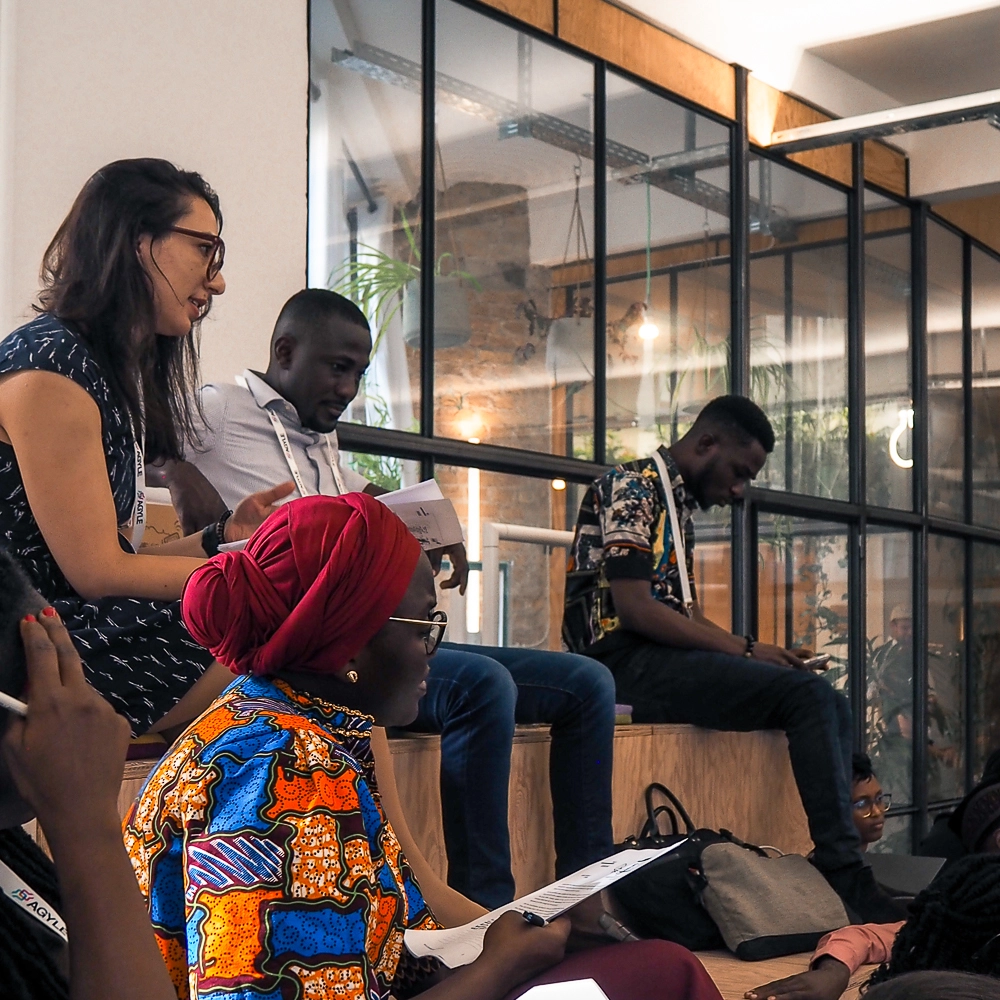
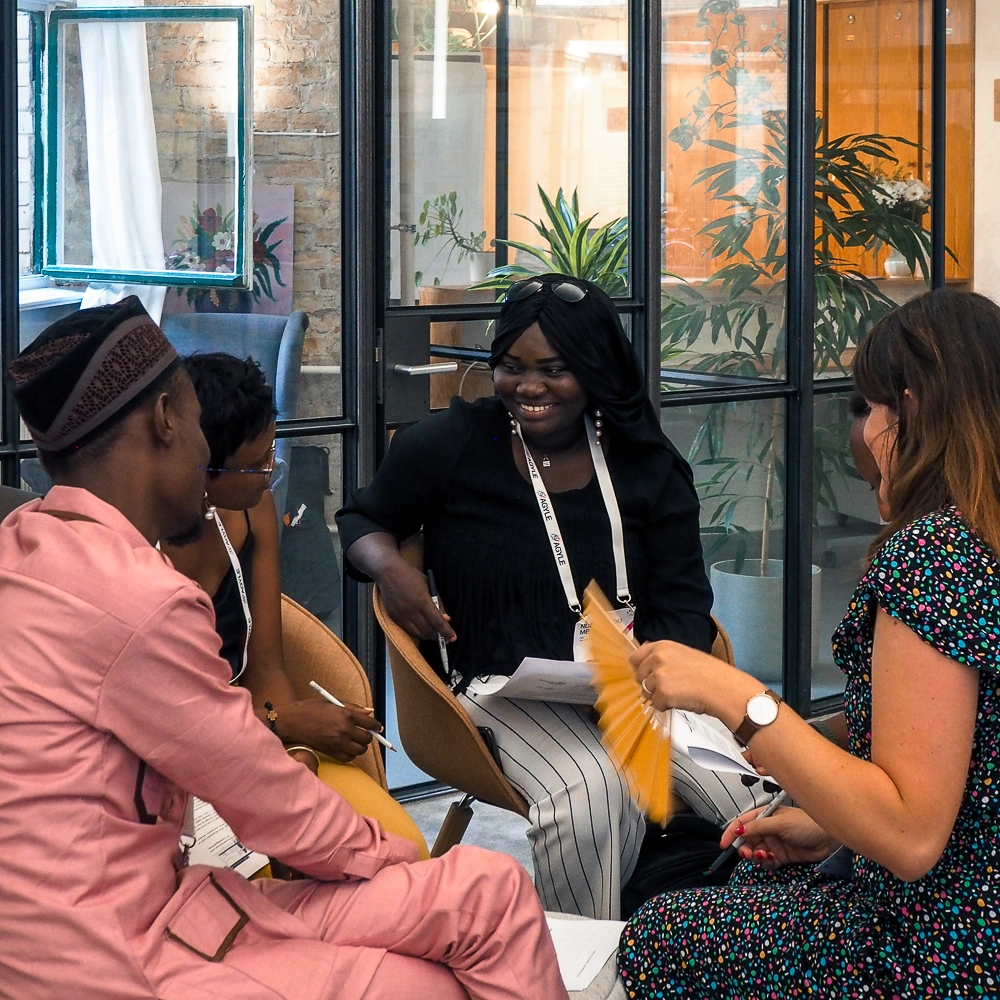
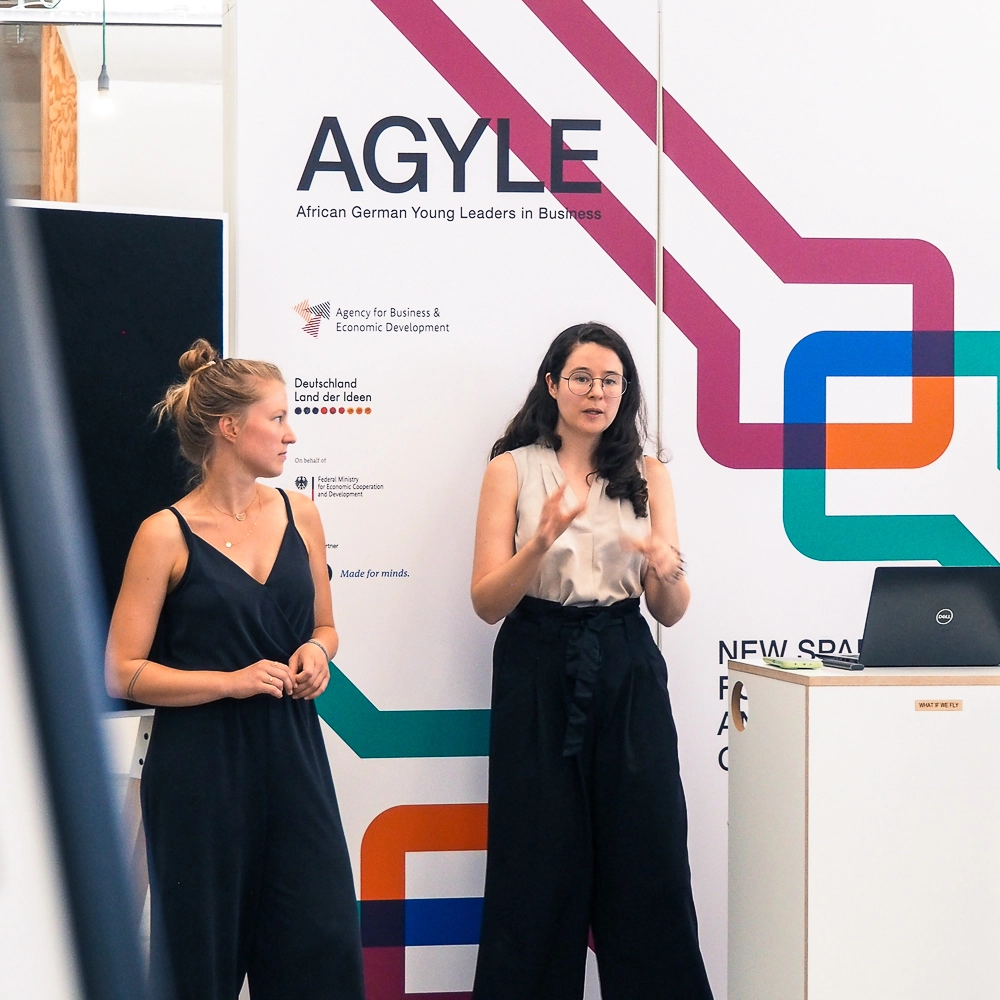
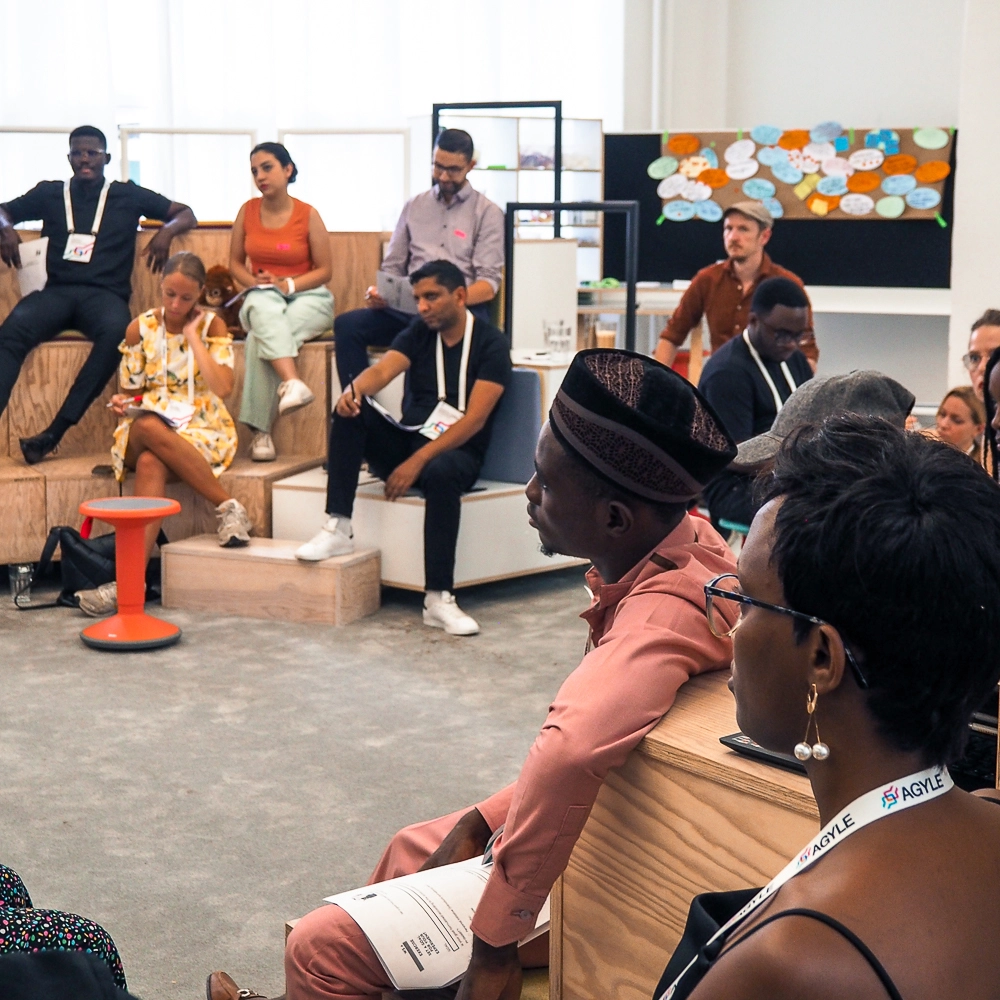
Democratic Republic of Congo | PADMPME | August 2021 – June 2023
Implementation of PI training in the DRC
In cooperation with PADMPME (Projet d’Appui au Développement des Micro, Petites et Moyennes Entreprises) under the leadership of the Congolese Ministry of Small and Medium Enterprises, move-eti implemented the PI training in the cities of Goma, Lubumbashi, Kinshasa and Matadi in the Democratic Republic of Congo (DRC). In the first two project cities, Goma and Lubumbashi, a total of 1200 women entrepreneurs benefited from participating in the Personal Initiative training. 600 women entrepreneurs received the training on their own (“PI training”), while another 600 women were trained in a new version of the PI training that included their spouses (“PI+ training”). The impact of both training versions will be evaluated using a randomised controlled trial (RCT) and is part of a research project on how to most effectively train women entrepreneurs in sub-Saharan Africa. move-eti is responsible for project management, including project coordination, conducting needs assessments, adapting the training, organising train-the-trainer workshops and evaluating the results.
Democratic Republic of Congo | PADMPME | August 2021 – June 2023
Implementation of STEP training in the DRC
In cooperation with PADMPME (Projet d’Appui au Développement des Micro, Petites et Moyennes Entreprises) under the leadership of the Congolese Ministry of Small and Medium Enterprises, move-eti implemented the STEP training in the cities of Goma, Lubumbashi, Kinshasa and Matadi in the Democratic Republic of Congo (DRC). A total of 1600 young people actively participated in the STEP training. move-eti was responsible for project management, including project coordination, conducting needs assessments, adapting the training to the target group, conducting train-the-trainer workshops and quality control.
Malawi | GIZ | December 2022 – May 2023
PI Booster – Developing a condensed version of PI Training for Malawi
In partnership with GIZ (Deutsche Gesellschaft für Internationale Zusammenarbeit), move-eti has successfully implemented a PI training initiative as part of a larger project to promote rural employment in Malawi, with a particular focus on youth empowerment. Specifically for this project, move-eti developed a condensed version of the PI training that retains the most important evidence-based content and follows the same action-oriented approach. The condensed version of the PI training relies heavily on participant-driven group sessions, significantly minimising the need for extensive trainer involvement. This innovation enables the training to effectively reach remote regions that are often difficult for PI facilitators to access. This allows the training to be delivered in remote areas that are not always easily accessible to PI facilitators.
Mozambique | GIZ | December 2022 – May 2023
Employment promotion in rural areas with a focus on youth in Mozambique
In partnership with GIZ (Deutsche Gesellschaft für Internationale Zusammenarbeit), move-eti has successfully implemented a PI training intervention in the regions of Nampula and Sofala, Mozambique, as part of a larger project to promote rural employment, with a special focus on youth empowerment. During the training of trainers, move-eti was also able to start training two new PI master trainer candidates. Once they have completed their training, they will be able to train new PI trainers in Mozambique, giving more Mozambicans access to PI training. In this partnership, move-eti is responsible for adapting the training, training the trainers and ensuring the quality of the implementation.
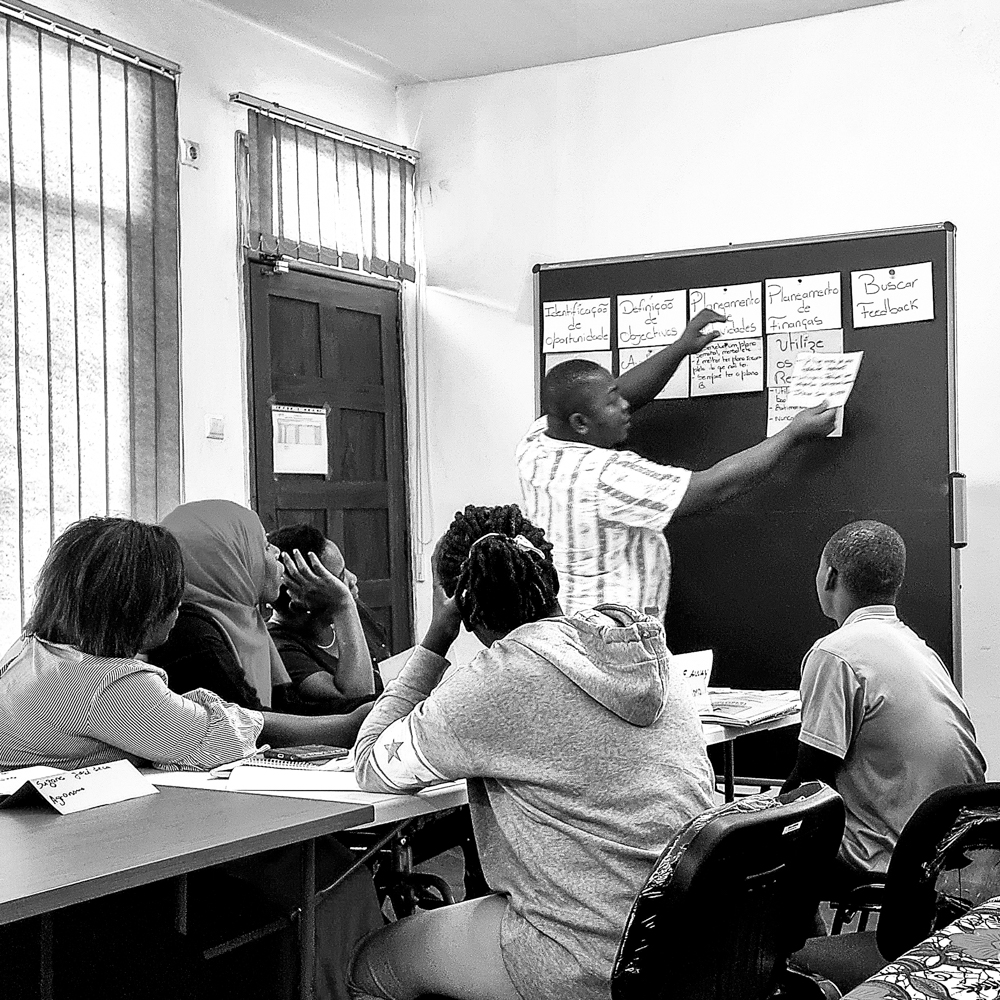
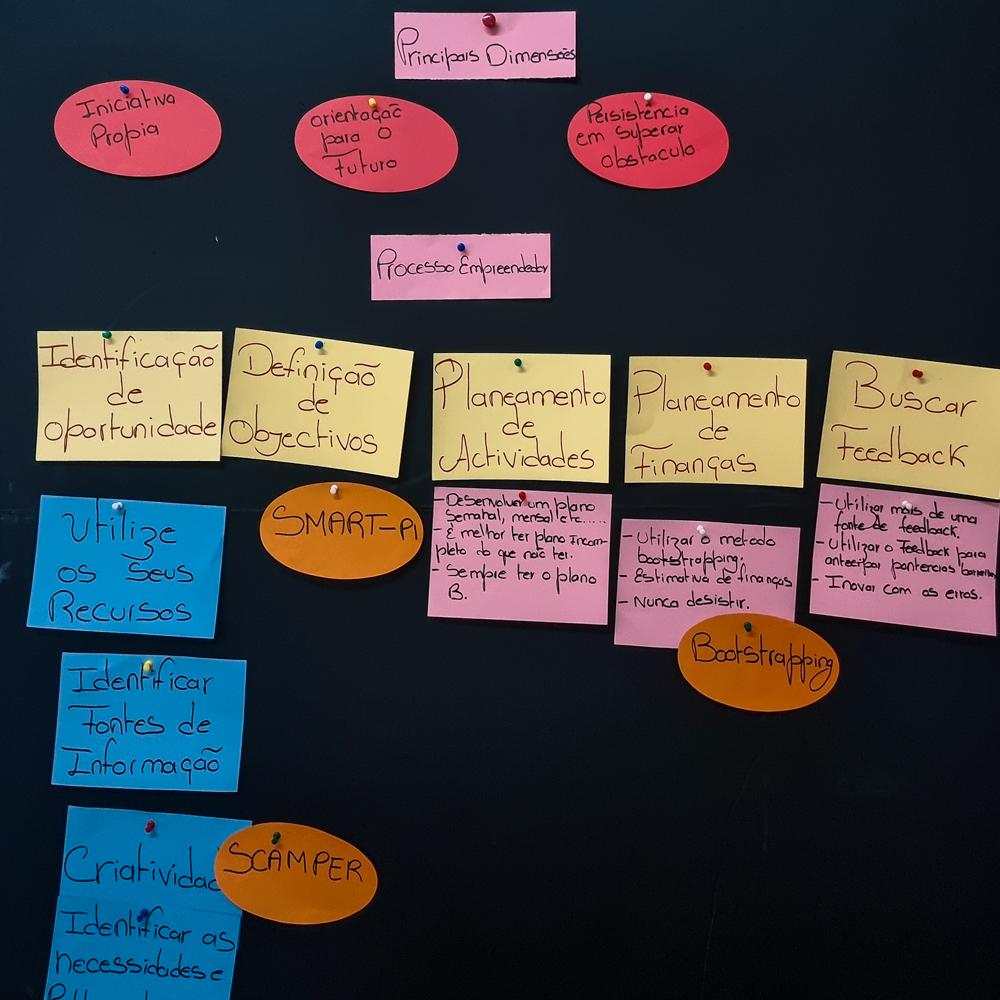
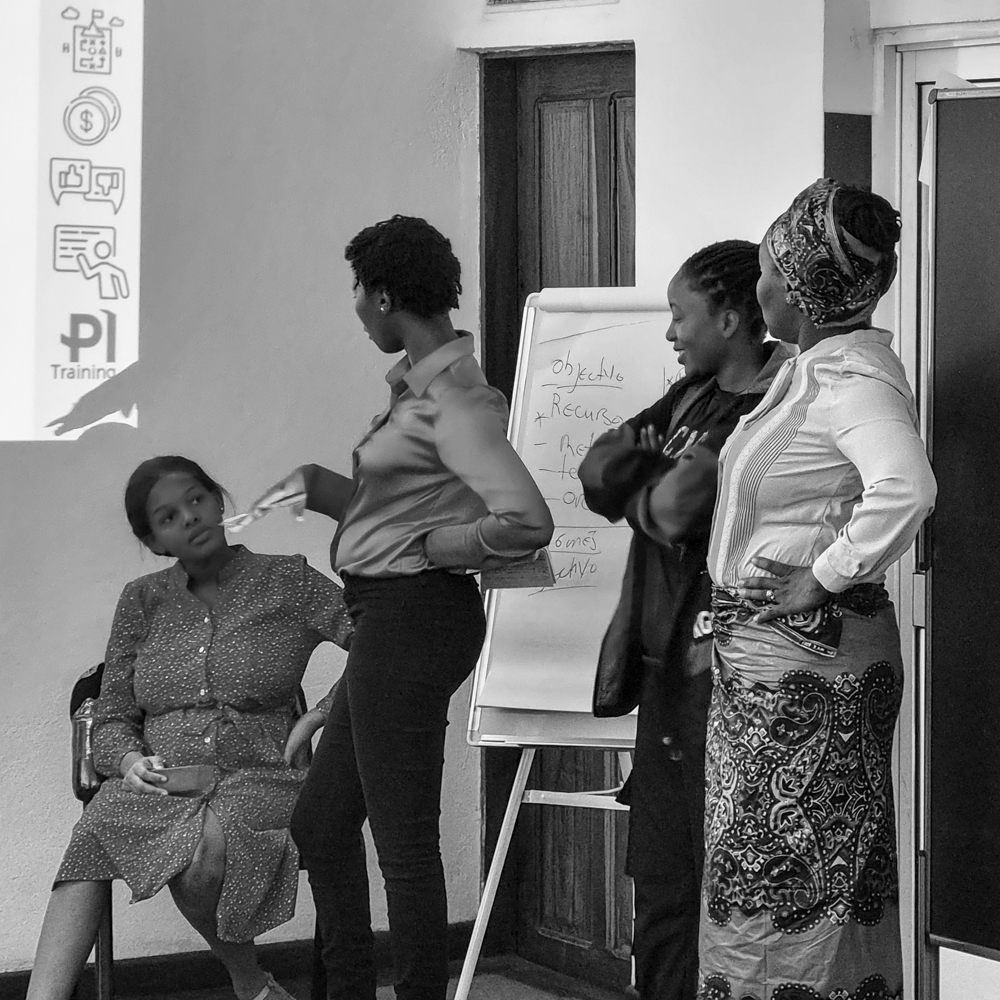
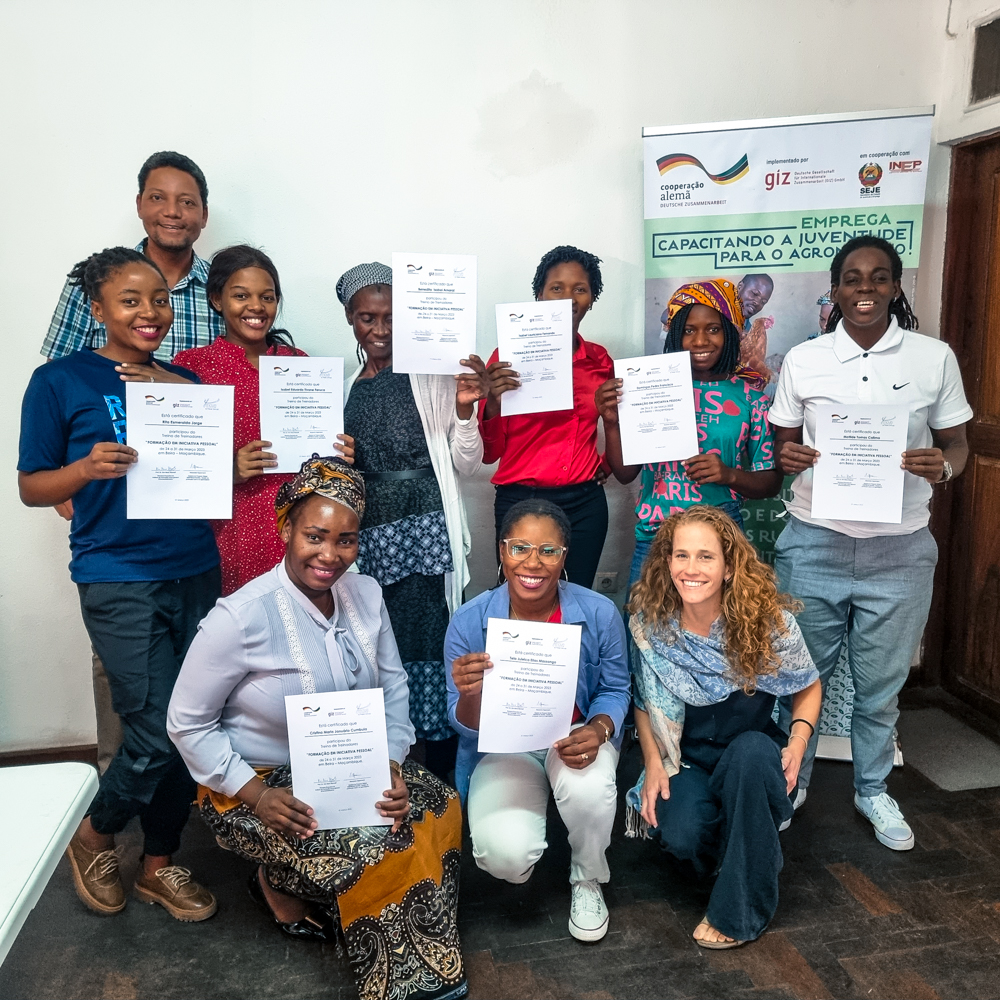
Uganda | MasterCard Foundation | October 2022 – December 2022
Adapting PI training for refugees in Uganda
In collaboration with the MasterCard Foundation, the Youth Social Advocacy Team-Uganda (YSAT) and the African Youth Action Network (AYAN), move-eti adapted and implemented the Personal Initiative Training (PI) for refugees in the two Ugandan cities of Kampala and Arua. Eleven trainers and two quality control assistants were certified during the training of trainers workshop and assured an effective implementation of the PI training. As project manager, move-eti coordinated the project, adapted the training programme to the needs of the refugees and conducted the training of trainer workshops.
Ethiopia | The World Bank | August 2020 – February 2021
PI training in Ethiopia
In collaboration with the World Bank, move-eti managed and coordinated a project focused on implementing Personal Initiative (PI) training for workers in an industrial park in Ethiopia. move-eti managed the project, including adapting the training programme and conducting train-the-trainer workshops.
Afghanistan | The World Bank | July 2020 –November 2020
Engaging youth for social and economic inclusion
In collaboration with the World Bank, move-eti led and implemented a project to promote the social and economic inclusion of youth in Afghanistan. move-eti provided PI training and PI coaching as part of the training of trainers workshops. The target group of the beneficiary training includes youth involved (or willing to get involved) in community projects. As project manager, move-eti was responsible for coordinating the project, adapting the training materials and conducting the training of trainer workshops.
Mauritania | The World Bank | September 2019 –November 2020
PI training in Mauritania and Master Trainer certification
In collaboration with the World Bank, move-eti implemented a project aimed at introducing Personal Initiative (PI) training for women working in the fishery sector in the free zone of Nouadhibou in Mauritania. move-eti delivered a PI training train-the-trainer and a PI coaching train-the-trainer. Two local PI master trainers were then trained as part of move-eti’s sustainable approach to building local PI capacity within local organisations. As project manager, move-eti was responsible for adapting training materials and conducting train-the-trainer workshops.
Armenia | The World Bank | June 2020 – August 2020
Study on Women’s Entrepreneurship and PI training for women entrepreneurs in Armenia
In collaboration with the International Finance Corporation (IFC) Armenia, move-eti implemented two rounds of train-the-trainer workshops on PI training for Armenian women entrepreneurs in the agriculture, high-tech and tourism sectors. In addition, move-eti trained one (1) local PI trainer to become a PI master trainer as part of move-eti’s sustainable training delivery approach. To date, approximately 600 women entrepreneurs in Armenia have received PI training. As project manager, move-eti coordinated the project, adapted the training programme to the needs of the women entrepreneurs and conducted train-the-trainer workshops.
Zambia | German Saving Bank Foundation | January 2018 – May 2020
PI coaching for employees of the National Bank Zambia
In cooperation with the German Savings Bank Foundation, (Deutsche Sparkassen Stiftung), move-eti managed and coordinated a project focusing on Personal Initiative (PI) coaching for employees of the National Bank. The aim was to increase the efficiency of project management. move-eti was responsible for developing a coaching intervention based on the theory of PI and for conducting coaching sessions as well as leadership sensitisation sessions.
Madagascar | The World Bank | April 2018 –November 2018
PI training in Madagascar
In collaboration with the World Bank, move-eti has implemented a project aimed at implementing Personal Initiative (PI) training in Madagascar. As part of the project, move-eti’s role included adapting the training programme, conducting train-the-trainer workshops and carrying out evaluations.
Kenya | DAAD & BMBF through Leuphana University of Lüneburg | February 2018 –October 2018
STEP training in Kenya
move-eti supported a STEP training project implemented by Leuphana University of Lüneburg. STEP was implemented at Mount Kenya University, Kenyatta University and Strathmore University. STEP was implemented on an annual basis over a period of three years. In addition, the impact of the training was continuously evaluated and showed positive effects. As part of the project, members of the move-eti team were responsible for project management, planning and implementing the training of trainers, developing training materials, ensuring effective communication and collaboration between partners, and overseeing and planning the evaluation study.
Nigeria | BMBF through Leuphana University of Lüneburg | February 2018 –October 2018
STEP training in Nigeria
move-eti supported a STEP training project implemented by Leuphana University of Lüneburg at Godfrey Okoye University in Nigeria. STEP was implemented on an annual basis over a period of three years. In addition, the impact of the training was continuously evaluated and showed positive effects. move-eti team members were responsible for project management, planning and implementing the training of trainers, developing the training materials, ensuring effective communication and collaboration between the partners, and supervising and planning the evaluation study.
South Africa | SEF | August 2018 – September 2018
PI training for microfinance loan recipients in South Africa
In collaboration with the Small Enterprise Foundation (SEF), move-eti managed a project aimed at providing Personal Initiative (PI) training to microfinance loan recipients in South Africa. As project manager, move-eti was responsible for adapting training materials and conducting train-the-trainer workshops.
Tanzania | Leuphana University of Lüneburg | September 2017 – October 2017
STEP at University of Dar Es Salam
move-eti supported a STEP training project carried out by Leuphana University of Lüneburg at the University of Dar Es Salam. STEP was implemented on an annual basis over a period of three years. move-eti team members provided support in refresher training-of-trainer workshops. The aim was to ensure sustainable implementation of the training.
Mongolia | GIZ | August 2016 – May 2017
PI training for the Integrated Mineral Resources Initiative (IMRI)
In collaboration with GIZ (Deutsche Gesellschaft für Internationale Zusammenarbeit), move-eti managed and coordinated a project focused on providing Personal Initiative (PI) training for the Integrated Mineral Resources Initiative (IMRI) in Mongolia. move-eti played a key role in coordinating the project and conducting training of trainers sessions.
Mexico | Leuphana University of Lüneburg | 2016, 2017 & 2018
STEP and PI training in Mexico
move-eti supported several STEP training projects carried out by Leuphana University of Lüneburg in collaboration with the Instituto Tecnológico Autónomo de México (ITAM), the Instituto Gustavo A. Madero (Tecnológico Nacional De México) and the Instituto Tecnológico de Puebla (Tecnológico Nacional De México) to implement STEP training for university students in Mexico. The members of the move-eti team contributed to the project management, planning and implementation of the training of trainers, adaptation of the training materials, ensuring effective communication and collaboration between the partners, and supervision and planning of the evaluation study.
PROJECTS WITH MOVE-ETI TEAM MEMBERS INVOLVED
Uganda | ADEPT via Leuphana University & Elisabeth Kuria | 2022
STEP training at Mbuye Agricultural College in Uganda
STEP was implemented at Mbuye Agricultural College in Mbuye, Uganda with the support of ADEPT (Africa’s Development – Education, Partners and Trainers) in collaboration with Leuphana University. The training materials were adapted to the capacities and realities of the agricultural students in Mbuye. As part of the project, move-eti team member Elisabeth Kuria was responsible for planning and implementing the training of trainers, developing the training materials and ensuring effective communication and collaboration between the partners. In addition, a new STEP Master Trainer was trained, who has already been involved in the creation of STEP and will be able to spread the STEP training to more students and institutions in Uganda.
Uganda | ADEPT through Leuphana University & Elisabeth Kuria | 2021
Butende Technical Institute in Uganda
STEP was implemented at Butende Technical Institute in Butende, Uganda, with the support of ADEPT (Africa’s Development – Education, Partners and Trainers) in cooperation with Leuphana University. The training materials were adapted to the capacities and realities of the students studying technical professions in Butende. Twelve teachers from Butende Technical Institute participated in the training of trainers and will deliver the STEP training to their students. As part of the project, move-eti team member Elisabeth Kuria was responsible for planning and implementing the training of trainers, developing the training materials and ensuring effective communication and collaboration between the partners.
Philippines | UNESCO through Leuphana University of Lüneburg & Elisabeth Kuria | 2019-2022
STEP at Bicol University, Philippines
STEP was implemented at Bicol University in Legazpi, Philippines, in cooperation with Leuphana University in Lüneburg, Germany. The project was supported by the German Commission for UNESCO. During the implementation of STEP at the university, the team was able to certify a new master trainer who is a professor at Bicol University. The new master trainer will be able to offer STEP training to institutions in other regions of the Philippines. In addition, Bicol University was so convinced of the STEP approach that it integrated the STEP training into its curriculum under the title “Entrepreneurial Minds”, which is accessible to all undergraduate students of Bicol University. As part of the project, move-eti team member Elisabeth Kuria was responsible for planning and implementing the training of trainers, developing training materials and ensuring effective communication and collaboration between the partners.
Liberia | Leuphana University of Lüneburg | 2011 – 2014
STEP at University of Liberia
move-eti supported a STEP training project at the University of Liberia in cooperation with Leuphana University. The German Commission for UNESCO was the main driving force in initiating and supporting the implementation of STEP in Liberia. The German Commission for UNESCO supported the project financially and established the relationship with the National Commission for UNESCO in Liberia and the University of Liberia. In addition, the Liberia project was the first STEP training to be conducted outside of Uganda. The project thus demonstrated that the STEP training can be applied in different international contexts and is useful not only for countries in East Africa but also in West Africa. The STEP training at the University of Liberia was the first training where the trainers were not involved in the development of the STEP training. This means that the concept, content and methodology of the STEP training was new to the trainers. It was essential to develop a train-the-trainer workshop to familiarise the University of Liberia’s team of trainers with the conceptual ideas behind STEP. The trainers participated in a three-day train-the-trainer workshop to become certified STEP trainers. The evaluation study showed that it is possible to train a team of trainers in a workshop in such a way that they grasp all the essential ideas of STEP and transfer them to the students attending the training.
Uganda | Leuphana University of Lüneburg, Makerere University | 2008
Development and First Implementation of STEP
Makerere University in Kampala, Uganda, was the first place to implement the STEP training. Makerere University is one of the largest universities in East Africa with internationally renowned scholars. In 2006, the team from Leuphana University, including move-eti founder Kim Marie Bischoff, had several discussions with scholars from Makerere University to initiate the STEP project. The overall aim was to provide a solution to the adverse labour conditions for students by developing entrepreneurship training. Over the following two years, the STEP training was developed as a collaborative effort between scholars from Makerere University, Makerere University Business School, Uganda Christian University, Kyambogo University and Leuphana University.
Given Makerere University’s key role in the region, it was clear that the STEP training should take place at Makerere University. In 2008, Makerere University students were informed of the opportunity to participate in the first STEP training. The response was overwhelming, with several hundred students applying for the training. Makerere University was the first university to offer STEP training to its students. The STEP training was successfully implemented and led to the first generation of students who were excited about entrepreneurship because of STEP. The STEP training clearly made a difference, as shown in several interviews we conducted with students over several years. All partners agreed that the training was a response to the adverse labour market conditions and that more students from different generations and institutions should benefit from the training. This was the impetus to extend STEP to other institutions and regions.
Uganda Christian University is a key partner and was part of the initial team of institutions involved in the development of the STEP training. Uganda Christian University has been one of the driving forces and has provided invaluable input at all stages of the development of STEP. At the same time as the STEP training was being implemented at Makerere University, the STEP training was also being run with students from Uganda Christian University in collaboration with a team from Leuphana University, including move-eti founder Kim Marie Bischoff. The positive results prompted Uganda Christian University to offer the training on an ongoing basis. Uganda Christian University was the first university to offer and manage a second round of STEP training.
OTHER STEP AND PI PROJECTS IMPLEMENTED BY LEUPHANA UNIVERSITY
South Africa | German Commission for UNESCO and University of Limpopo | 2018 – 2024
STEP S – Implementation of Sustainable STEP Training in South Africa
The University of Limpopo was the first university in South Africa to implement STEP in 2018, in partnership with Leuphana University. It is located in Mankweng, Limpopo Province. The German Commission for UNESCO supported the project, and it was an important step in scaling up the training to another country and context. After two successful implementations in 2018 and 2019, STEP was expanded to include the topic of sustainability for the third round of training in 2020. This was the first implementation of STEP S, a version of the training that promotes entrepreneurial and sustainability-oriented thinking and aims to create entrepreneurs who solve societal or environmental problems in particular. Three former STEP trainees from the University of Limpopo became facilitators for the third round of training, demonstrating the high level of commitment and ownership of STEP at the partner institution. The evaluation included weekly in-depth interviews with training participants. This allowed us to better understand the processes of the training.
Burkina Faso | The World Bank | July 2022 – December 2023
PI Training for small-scale cross-border traders in Burkina Faso
As part of the World Bank’s Trade Facilitation Initiative in West Africa, a team from Leuphana University aims to improve the business skills of small-scale cross-border traders in Burkina Faso. The project is part of a research project using a randomised control trial (RCT) involving 1,671 traders to evaluate the impact of Personal Initiative Training.
Niger | The World Bank | July 2022 – December 2023
PI Training for adolescent girls in Niger
As part of the SWEDD (Sahel Women’s Empowerment and Demographic Dividend) project funded by the World Bank, a team from Leuphana University is evaluating the impact of Personal Initiative Training for adolescent girls. A randomised control trial (RCT) compares the PI training with the entrepreneurship training used in SWEDD. Out of 3,000 selected girls, 1,000 will receive the PI training, 1,000 will receive the SWEDD entrepreneurship training and 1,000 will receive no additional training.
Uganda | DAAD | September 2017 – December 2021
STEP at secondary schools in Uganda
The core objective of the project was to create a novel entrepreneurship curriculum for future educators based on the STEP training. The resulting curriculum was to be used in various universities in East Africa, with a particular focus on Uganda. Its primary goal was to equip student teachers with the skills needed to effectively teach entrepreneurship at secondary school level. The effectiveness of the training intervention was evaluated using a randomised controlled trial.
Mozambique | The World Bank | May 2017 – April 2020
PI training for female farmers in Mozambique
As part of a World Bank project led by the Trade and Competitiveness Global Practice, the World Bank’s Africa Gender Innovation Lab (GIL) conducted a randomised control trial study to measure the impact of a training intervention on a sample of 2,000 poor women farmers in 100 communities in Tete Province, Mozambique. The intervention provided all women in the sample with training in agronomy and basic business techniques. Half of the sample also received training in personal initiative, adapted to the specific context of agricultural entrepreneurship by a team from Leuphana University Lüneburg.
Lebanon | DAAD & AZM University | 2019
STEP training in Lebanon
As part of a DAAD-funded project to establish a network of universities to jointly promote entrepreneurship education in Lebanon, Leuphana University, in collaboration with AZM University, has implemented STEP training to prepare students for extracurricular activities related to national and international entrepreneurship competitions. After the first successful implementation in 2019, the Arab Open University joined the project in 2020 to implement STEP in both universities. It was the first implementation of STEP in a synchronous but virtual learning style. The vibrant exchange between researchers and project coordinators from all participating institutions demonstrates the strong interest in further promoting entrepreneurship and entrepreneurship education in Lebanon.
Jamaica | Inter-American Development Bank | 2017 – 2019
Examining different versions of PI training in Jamaica
A research project in Jamaica examined the impact of a combination of PI and business practices training compared to a version of PI training that focused specifically on persistence. The project was initiated by the Inter-American Development Bank in Jamaica and implemented by a team from Leuphana University. About 1,000 entrepreneurs from the capital, Kingston, and surrounding communities were assigned to one of the two training groups or to a control group. In addition to contrasting PI training with a combination of PI and business practices training, a distinctive element of this project was its behavioural focus in measuring the outcomes of the intervention.
Ethiopia | The World Bank | 2015 – 2017
Randomised control trial of PI training in Ethiopia
In Ethiopia, a team from Leuphana University implemented PI Training as part of the World Bank’s Women Entrepreneurship Development Project. They randomly selected and assigned 2,000 growth-oriented women entrepreneurs in Ethiopia’s capital, Addis Ababa, to either PI Training, a holistic business training, or a control group. The research design aimed to understand the specific outcomes and mechanisms of the different training approaches.
Mexico | The World Bank & Crea | 2014 – 2016
PI training for women entrepreneurs in Mexico
In Mexico, a team from Leuphana University delivered PI training together with business literacy training to women entrepreneurs. The project was a collaboration between Leuphana University, the NGO Crea and the World Bank. A total of 3,200 women entrepreneurs participated in the programme. 1,600 women were assigned to a training condition and 1,600 to a control group. The research focused on the factors that lead to business success. Proactive behaviour and entrepreneurial empowerment were hypothesised to be the mechanisms through which proactive behaviour improves business performance.
Nicaragua | The World Bank
Randomised control trial of PI training in Nicaragua
As part of a World Bank project led by the Pilot Interventions to Increase the Impact of Rural Roads on Factor Accumulation and Productivity in Nicaragua, the Leuphana University team contributed to a randomised control trial study. The target population was a sample of 700 household heads or spouses in rural Nicaragua. The intervention provided training in personal initiative to all participants in the sample. 350 households in the sample also had the opportunity to open a simple savings account, which offered the chance to invest more in self-employment and set savings goals.
Togo | The World Bank and PADSP | 2014 – 2016
Randomised control trial of PI training in Togo
In Togo, a team from Leuphana University conducted a randomised controlled experiment with 1,500 micro-entrepreneurs. They compared two types of training to increase business success: Business training, which provided business-related skills and knowledge, was compared with personal initiative training, which changed the mindset of entrepreneurs to increase their personal initiative. 500 microentrepreneurs were in the control group. We wanted to understand the boundary conditions of both trainings, i.e. what characteristics determine whether a person will benefit more from business training or more from personal initiative training. The team also looked at the processes by which the training influenced business success. They were also interested in differences between women and men in the success of business training. The project was initiated by the World Bank and implemented in partnership with PADSP in Togo.
Rwanda | School of Finance and Banking in Rwanda & University of Rwanda | 2006
Development and initial launch of STEP training in Rwanda
The University of Rwanda, through the School of Finance and Banking in Kigali, Rwanda, was part of the wider team that launched STEP in 2006, together with Leuphana University. The School of Finance and Banking was a co-partner and participated in all the preparatory workshops that preceded the first implementation of the STEP training. The School of Finance and Banking was thus informed about the conceptual and methodological ideas underlying the STEP training. As a result, it was easy for the School of Finance and Banking to grasp the idea and implement STEP in its institution. The School of Finance and Banking was involved in all important decisions regarding the STEP training. The School of Finance and Banking can therefore be considered as one of the founding partners of the STEP programme. Having the School of Finance and Banking as a partner from Rwanda was important to ensure that the STEP training would meet the requirements of a training that would be applicable in the wider context of East African countries.
Uganda | DAAD, German Research Foundation & Makarere University
Initial randomized control trials of PI training in Uganda
A project in Uganda was the starting point for the first randomised controlled experiment on PI training, conducted by a team from Leuphana University. It involved 47 participants in PI training and 53 entrepreneurs in a wait-list control group. The team measured personal initiative and success at several points in time (4-5 months after the training and 12 months after the intervention). This study also began the team’s tradition of using evidence-based approaches to develop and evaluate PI training. This project was supported by the Markere University Business School, the DAAD and the German Research Foundation.

move-eti gGmbH
Entrepreneurship Training Institute
Liebenwalder Straße 12
13347 Berlin
